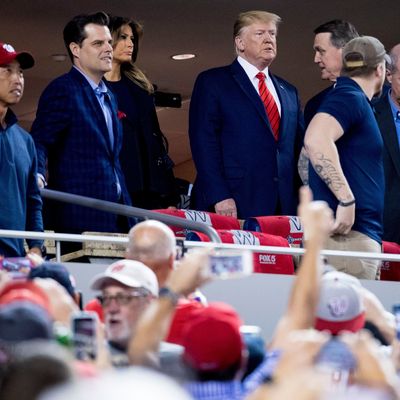
A couple of years ago, the actor Seth Rogen realized, to his amusement and slight alarm, that Donald Trump Jr. was following him on Twitter. His reaction was completely sane:
One of the more demoralizing aspects of the Trump presidency has been the sense of helplessness it has fostered. The man can confess to crimes on-camera, have rock-bottom approval ratings, be the world’s increasingly distressing joke in every imaginable fashion, but yet … he’s still here, and he’s still in charge. We can protest, we can organize, we can rally, we can #resist, and while all those things are (obviously) vital, they don’t provide the cathartic satisfaction that it feels like simply rolling up your sleeves yourself and Doing Something, Dammit, would. You want to just scream in the guy’s face, right? This is what Rogen was getting at. He can Tweet and rally and make mildly (but only mildly) political movies about the current situation, but there’s nothing like saying something directly to one of the people who are making this nightmare happen. Cutting through all the people paid to stand in our way and letting them know exactly how you and so many others think might not make a difference … but it can feel like it. I went through something similar when I learned Kellyanne Conway was inexplicably following me on Twitter. I sent her several direct messages myself, politely asking her to please stop destroying everything. I know it didn’t do anything — I did not hear back from Kellyanne! — but, you know, you gotta do something.
I thought a lot about Seth Rogen and Kellyanne Conway and this oppressive helplessness while watching game five of the World Series, at which 50,000 or so Washington Nationals fans, upon seeing President Donald Trump on the big screen, booed him with the strength of a thousand suns.
Perhaps most amusing about this booing was how the Nationals anticipated it, tried to work around it, and ultimately only accentuated it. The “Wave Your Caps” segment before Trump came on is a regular feature at Nationals game as a way to salute the military, as is the requisite “Thank You for Your Service” that followed it. The hope clearly was that fans would be so busy applauding servicemen and servicewomen that the applause would bleed into Trump’s appearance. But all this did was emphasize how dramatic the shift to boos became when Trump appeared on-screen … and then how everyone immediately went back to cheering when more servicepeople appeared. It was unmistakable. And I will not lie to you: I think I have watched this exact scene from about 50 different angles at this point. It’s a heady time.
It is not unusual for a politician to be booed at a sporting event. It sort of comes with the job description. Every politician is booed when shown at a sporting event. It happened to George W. Bush, it happened to Obama, it happened to Dick Cheney, it happened to Sarah Palin (at a hockey game!), it even happened to Michelle Obama and Jill Biden (at a NASCAR event). There are some places a Democratic president might be booed a little louder than a Republican one, and vice versa (though that shouldn’t be overstated; here are thousands of southern college football fans booing Trump in Atlanta when he was shown on the jumbotron at the National Championship game two years ago), but on the whole: If you go to a game and you are a public officeholder, you are going to get booed. That Trump would be surprised by this is not surprising, but nothing else about it should be.
It still felt great, didn’t it? One can, if one wishes, have a Joe Scarborough–esque debate about the relative appropriateness of chanting “Lock him up” at Trump (it would seem to me that chanting “Lock him up” at Trump is a bit different from yelling “Lock her up” at Hillary Clinton considering the former is under investigation for dozens of crimes and in fact invented the very chant being used against him, while the latter isn’t and didn’t, but what do I know? I don’t have a political television show) yet still appreciate that tens of thousands of people took advantage of the unique opportunity to let Trump know what they think of him in front of the entire world, right? As the Washington Post pointed out, emphasized by ABC News’ Karen Travers, game five was the rare moment in which Trump was in a public place that wasn’t the White House, a federal building, or an edifice that he owns (or has his name on). He stuck his head out of the hole and faced the world naked for a moment, and the world instantaneously let him know how it felt about him. They could not have coordinated it any better.
It reminded me, as a Knicks fan, of James Dolan. Dolan famously hasn’t been publicly introduced at Madison Square Garden at a Knicks game — he owns the building and the team — in more than a decade, and with absolutely good reason: The minute his name was announced, the boos would be so overpowering there’d be nothing left of him but a guitar pick signed by Glenn Frey and a few strands of hair. So he hides. Dolan, like Trump, appears only in places where he can personally control the audience and the message. Along with his all-encompassing awfulness (like Trump), this has led to a buildup of vitriol that must eventually be released. In many ways, game five was the perfect storm of Trump booing: weeks of hiding from anyone but his most loyal supporters; a month of reveals of his boorish, criminal behavior; ten seconds of angry fans (whose team was about to lose its third game in three nights) having the opportunity to vent their spleen; and his general obliviousness as to how this was going to turn out. We may never again have forces align for such a pure, unadulterated display of revulsion.
Trump may be in office for another year or so, or less than that, or, God forbid, five (or more!) years. But here’s a safe bet: He’ll never appear at another sporting event like that again. Even if Trump were popular, he’d be booed at games he attended. But as underwater as he is? A reception like last night’s will await him wherever he may go. And the rest of the world sees this. I had several overseas friends tell me this morning how relieved they were to see him treated that way, particularly by the primarily white and older baseball fan base. People have so few real opportunities to tell him how they feel about him in a way he absolutely cannot deny. The World Series and sports in general give us that chance. So boo. Boo until you cannot boo any longer. And then boo some more. It might not make a difference. But dammit, it can’t hurt.






























